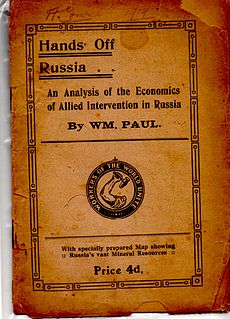Related Research Articles

The Workers' Socialist Federation was a socialist political party in the United Kingdom, led by Sylvia Pankhurst. Under many different names, it gradually broadened its politics from a focus on women's suffrage to eventually become a left communist grouping.

The Communist Party was a Left Communist organisation established at an emergency conference held on 19–20 June 1920 at the International Socialist Club in London. It comprised about 600 people.

Arthur James Cook, was a British trade union leader who was General Secretary of the Miners' Federation of Great Britain from 1924 until 1931, a period that included the 1926 General Strike.

Arthur MacManus (1889–1927) was a Scottish trade unionist and communist politician.
The Miners' Federation of Great Britain (MFGB) was established after a meeting of local mining trade unions in Newport, Wales in 1888. The federation was formed to represent and co-ordinate the affairs of local and regional miners' unions in England, Scotland and Wales whose associations remained largely autonomous. At its peak, the federation represented nearly one million workers. It was reorganised into the National Union of Mineworkers in 1945.

The Communist League was a small far-left organisation in the United Kingdom which existed during the year of 1919. Its stated goal was to establish a network of workers' councils that would "resist all legislation and industrial action directed against the working class, and ultimately assuming all power, establish a working class dictatorship".
The Socialist Party of British Columbia (SPBC) was a provincial political party in British Columbia, Canada, from 1901 to 1905. In 1903, the SPBC won seats in the Legislative Assembly of British Columbia.
Thomas Hargrave Bell was a Scottish socialist politician and trade unionist. He is best remembered as a founding member of both the Socialist Labour Party and the Communist Party of Great Britain and as the editor of Communist Review, the official monthly magazine of the latter.

William Paul (1884–1958), often known as Willie or Bill Paul, was a British socialist politician.
Robert "Robin" Page Arnot, best known as R. Page Arnot, was a British Communist journalist and politician.

The Socialist Labour Party was a socialist political party in the United Kingdom. It was established in 1903 as a splinter from the Social Democratic Federation (SDF) by James Connolly, Neil Maclean and SDF members impressed with the politics of the American socialist Daniel De Leon, a Marxist theoretician and leading figure of the Socialist Labor Party of America. After decades of existence as a tiny organisation, the group was finally disbanded in 1980.
The Communist Unity Group (CUG) was a small communist organisation in the United Kingdom.
The Communist Labour Party was a Communist Party in Scotland. It was formed in September 1920 by the Scottish Workers' Committee and the Scottish section of the Communist Party, some members of the Socialist Labour Party (SLP) and various local communist groups. In the same month, the Communist Party of South Wales and the West of England was founded, with a very similar programme.

Socialism in the United Kingdom is thought to stretch back to the 19th century from roots arising in the aftermath of the English Civil War. Notions of socialism in Great Britain have taken many different forms from the utopian philanthropism of Robert Owen through to the reformist electoral project enshrined in the birth of the Labour Party.

The British Socialist Party (BSP) was a Marxist political organisation established in Great Britain in 1911. Following a protracted period of factional struggle, in 1916 the party's anti-war forces gained decisive control of the party and saw the defection of its pro-war right wing. After the victory of the Bolshevik Revolution in Russia at the end of 1917 and the termination of the First World War the following year, the BSP emerged as an explicitly revolutionary socialist organisation. It negotiated with other radical groups in an effort to establish a unified communist organisation, an effort which culminated in August 1920 with the establishment of the Communist Party of Great Britain. The youth organisation the Young Socialist League was affiliated with the party.

Far-left politics in the United Kingdom have existed since at least the 1840s, with the formation of various organisations following ideologies such as Marxism, revolutionary socialism, communism, anarchism and syndicalism.
Edgar Thoreau Whitehead (1890–1956) was a British political activist, who served on the executive of the Communist Party of Great Britain but later became a fascist.
William James Hewlett was a British trade unionist and socialist activist.
The Executive Committee of the Communist Party of Great Britain was the governing body of the Communist Party of Great Britain between 1920 and 1991. It governed the party between congresses, at which successive ECs were appointed/elected. The EC played an important leadership role, according to the principles of democratic centralism to which the CPGB adhered.
References
- ↑ "Mines for the Nation or Mines for the Miners?".
- ↑ "The burial of the CPGB".
- 1 2 3 Klugmann, James (1968). History of the Communist Party of Great Britain. London: Lawrence and Wishart. pp. 21–36.
- ↑ Mark Hayes, The British Communist Left 1914-45
- ↑ "For Communist Unity".